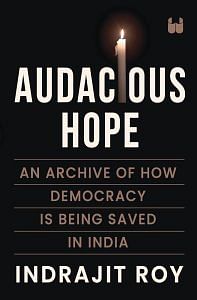Episodes of democratic crises hardly appear to be germane to hope. The repression unleashed during such times is rightly associated with fear. Dissent is crushed. Discipline is celebrated. Divisions are fomented. Suspicion bordering on hatred becomes the order of the day. Under such conditions, hope seems to be nothing more than a wasted emotion.
And yet, it is powerful. By wielding it, democratic erosion is constantly challenged. Often, such challenges are mounted by ordinary people who appear weak, meek and powerless in the first instance. Their resistance may not always be successful. The regime might remain unchanged. But nevertheless, their actions reflect the value of sustained dissent. Hope expresses itself through ordinary people’s resistance in the face of brutal, unrelenting repression.
General Augusto Pinochet discovered this soon after assuming power in Chile. The wave of executions, torture and ‘disappearances’ his regime unleashed did not go unopposed. Even as protests were officially banned, women began sewing secret messages of rebellion into quilts that were then sold in domestic and international markets. These narrative quilts, or arpilleras, conveyed powerful messages of hope for a future in which they would enjoy economic and political freedoms. One arpillero showed women holding up signs demanding ‘bread, work and liberty’. Another showed women in a neighbourhood pooling their money together to buy staples to share. Other signs declared ‘We women demand our rights’, ‘No more jails’ and ‘If women are not here, democracy does not go anywhere’. The arpilleras showed the world not only the horrors faced by people under Pinochet’s brutal regime but also the hope for a return of democracy harboured by some of Chile’s poorest citizens.
In Pakistan, General Zia ul-Haq discovered something similar. His regime limited political activity in the country and introduced a slew of legislations that curtailed human rights in the name of Islamising the country. But hope could not be crushed. The couplet Hum Dekhenge (We Shall See) composed by poet Faiz Ahmed Faiz gave voice to the regime’s opponents and the people at large:
Inevitably, we shall also see the day
that was promised to us, decreed
on the tablet of eternity.
When dark peaks of torment and tyranny
will be blown away like cotton fluff;
When the earth’s beating heart
will pulsate beneath our broken feet;
When crackling, crashing lightning
will smite the heads of our tormentors.
The couplet became a collective expression of courage, faith and optimism for a generation of Pakistanis confronted with the deadly cocktail of military rule and the infusion of religion in politics. It became a rallying cry for the thousands of ordinary folks across the country to challenge the authoritarian tactics of their dictator through myriad overt and covert ways, not least through poetry, drama and works of art.
Likewise, Nazi Germany’s totalitarian regime also found it impossible to completely snuff out hope. One must remember the White Rose resistance group founded by a group of university students in Munich: the siblings Sophie and Hans Scholl, Christoph Probst, Willi Graf, Kurt Huber and Alexander Schmorell. The group secretly printed leaflets and painted graffiti that urged Germans to support ‘freedom of speech, freedom of religion and protection of the individual citizen from the arbitrary action of criminal dictator-states’. Although Sophie and Hans Scholl as well as Christoph Probst were eventually arrested and guillotined, their efforts were an exemplary display of courage and persistence in the most desperate of times.
India’s nineteen-month Emergency was also not unchallenged. Street mobilisations, cultural activities and individual acts of sabotage continued despite numerous arrests. Many among those imprisoned refused to give up. The letters exchanged regularly between Pramila and Madhu Dandavate, a socialist couple who were jailed, bear testimony to their faith. Married for over twentythree years, they found themselves housed in prisons separated by over 400 kilometres. Their weekly letters commented on society and politics around them and also served as a reminder, as a reason to persist. When either showed signs of despair, the other sought to lift their spirits:
Your last letter had a shadow of sadness over it. You said that our home and life together would be completely destroyed by the time we get out of here. And you don’t know if you have the strength and persistence to do it all, all over again. Your comment felt exceedingly hopeless to me. We have always carried our life together on our backs. As long as our spine is in place, who can possibly touch our life together?
Similarly, people in Apartheid-infested South Africa continued to believe in the possibility of a return to democracy despite the viciousness of the regime. One among several instances of such faith was expressed by school students in the township of Soweto, Johannesburg, during 1976. Under the leadership of Teboho Tsietsi McDonald Mashinini, they protested the imposition of Afrikaans, the language of the Dutch-speaking white population, upon the rest of the country. The Soweto Uprising (as the protest came to be called) lasted three days and saw up to 20,000 students from high schools streaming through the streets. The state’s response was swift and brutal: almost 700 children were killed in police firings. Although the uprising was eventually quelled by sheer government repression, it marked the beginning of the end of the Apartheid regime.
Hope similarly fused with resistance against the segregationist policies of the United States. In an essay poignantly titled ‘A Testament of Hope’, civil rights advocate Martin Luther King tells us why he remains an optimist despite the brutality of segregation enforced by the state:
Millions of people have fought thousands of battles to enlarge my freedom; restricted as it still is, progress has been made. This is why I remain an optimist, though I am a realist, about the barriers before us.
In a well-known interview with Playboy, King recounts this
conversation over the telephone he has with his brother:
My brother described the terror in the streets as N*****s, furious at the bombings, fought whites. Then, behind his voice, I heard a rising chorus of beautiful singing: ‘We shall overcome.’ Tears came into my eyes that at such a tragic moment, my race could
sing its hope and faith.
These examples are far from comprehensive. But they illustrate the larger point about the importance of belief in democracy against all odds. Ruthless repression, divisive machinations and autocratic practices are rejected. Resistance stems from a spirit of stubborn hopefulness—an ability to persevere despite the entrenchment of despair. Far from a wasted emotion, hope motivates action against injustice, allowing one to imagine an alternative world that is fairer and more just than the existing one. And from such audacious hope spring the ideas that allow people to confront, subvert and undermine democratic decline.
 This excerpt from Indrajit Roy’s ‘Audacious Hope’ has been published with permission from Westland Books.
This excerpt from Indrajit Roy’s ‘Audacious Hope’ has been published with permission from Westland Books.



